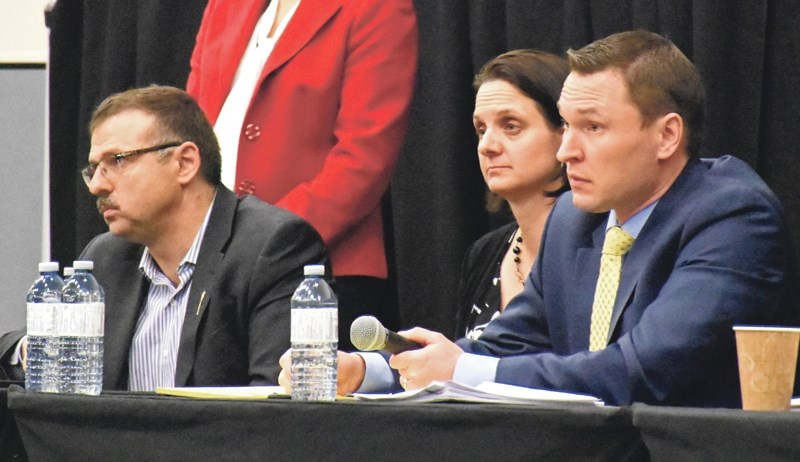The debate around Bill 6 issue showed no signs of quieting down at the public hearing in Athabasca last Wednesday.
Hundreds of farmers and spectators came to sound off at the meeting at the Athabasca Regional Multiplex on Dec. 9 — a handful of them carried signs to “Kill Bill 6” and dozens of others signed a petition calling for a plebiscite for the public have a direct vote on the legislation.
“How many farms have you been on?” the crowd asked Deron Bilous, Alberta Minister of Economic Development, during his introduction.
At one point, former Wildrose MLA candidate Travis Olson stepped up to the microphone and asked the crowd to raise their hand if they opposed the bill.
Hundreds of hands filled the air.
But, not everyone who showed up to the meeting was anti-Bill 6.
Peter Opryshko, a Grassland farmer, commended the government for creating the Bill, but he chastised the crowd for waiting so long to speak out against the powers-that-be.
“I’d like to ask many of the people who are here, where were you when they got rid of the Canadian Wheat Board?” he asked. “Did you demonstrate like this?
“Some of you were in Amber Valley Hall when Calgary Power destroyed our local electrical system and most of you jumped to let Calgary Power do it. Where were you when Mike Cardinal deregulated our electricity? Now that all the chickens have come to roost, you’re suddenly realizing their lives stink.”
The crowd booed for Opryshko to go home.
The reaction was much the same whenever Bilous, Danielle Larivee, the minister of Municipal Affairs, and Athabasca-Sturgeon-Redwater MLA Colin Piquette spoke to explain the legislation and new amendments.
Not even the representatives from Occupational Health and Safety (OHS) and Workers’ Compensation Board (WCB) were safe from the heckling when they fielded the technical questions.
The day before the hearing, the Alberta government announced that paid and non-paid family members – spouses, children, cousins, in-laws, step-siblings and a host of others – and non-paid workers, like neighbours, would be exempt from WCB and OHS regulations under Bill 6.
Two days later, the bill was passed in the legislature.
As of Jan. 1, 2016, WCB coverage for paid non-family workers would come into effect, but farmers have until April to enrol with WCB.
At the Dec. 9 public hearing in Athabasca, Larivee explained that Bill 6 was meant to provide the most basic level of protections for non-family paid farm employees that all Alberta workers have and the government wouldn’t budge on that.
“That’s the basic rights (to) compensation, if they’re injured; the basic right to a safe workplace; and the right to refuse unsafe work -— that’s it,” she said. “That’s all that’s part of Bill 6 and we are committed to moving forward with that.”
However, the recent amendments were news to many of the audience members, who pointed out that online government communications hadn’t been updated to include the changes.
“You are trying to lead us without information, consultation and actual knowledge,” said a cattle grain farmer. “People are emotional because they are misinformed.”
The lack of details had some questioning why the government couldn’t hold off on passing legislation, but Piquette was quick to defend the bill.
“The way this thing rolled out was screwed up,” he said amid the roar of the crowd. “However, if we don’t push through, who’s going to look at this again? If we can prevent one death and I lose my seat as a consequence, that’s a fair trade.”
He added that he would vote for the legislation, even if it went against what some of his constituents wanted.
“I’m here to represent the best interests of all my constituents, not just the people who come into the hall and yell at me,” he explained after the hearing.
“I am responsible to them, but I’m also responsible to a lot of other people. In the very end, I am responsible to my conscience and I know this is the right thing to do. If people don’t agree with me about that, they have the right in three-and-a-half years to give me the boot. That’s how our system works.”
For years, the Conservative government relied on an “educate, not legislate” mentality. But, Piquette noted that education without legislation didn’t work, but the crowd misheard.
“You people up there said education doesn’t work, but I was actually planning on working on implementing education programming for Grades 1-12 in all rural and small-town schools. But, I guess now I should probably just not worry about that now,” said Joyce Scobey, a farmer in Athabasca County.
Afterwards, Piquette clarified that his statements referred to a 2008 study done in Saskatchewan that found farm-safety educational programs didn’t improve farm safety, hazards or injuries without legislation to back it up.
“It just boils down to the principle that you don’t know what you don’t know and the legislation gives you that strong incentive to make sure you know,” Piquette said.
Farmers like Scobey said safety was already a priority, but Bill 6 fails to protect those most likely to get injured —the farm owners and children.
“That family exemption thing means that families aren’t protected any more, which is what you guys said you started out wanting,” she said. “You wanted to avoid the three little girls that died sadly in that bin. The way you got it now, they’re still not protected.”



